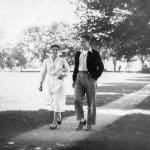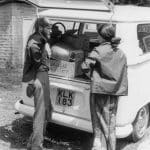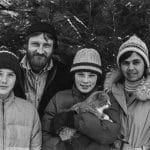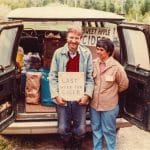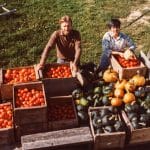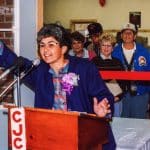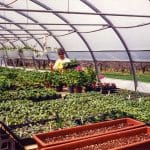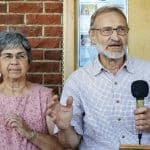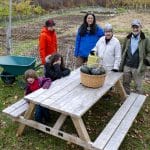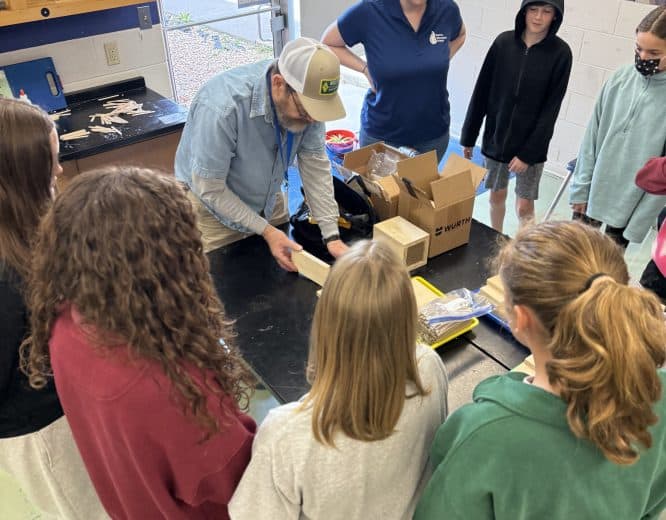Keith and Ellen Helmuth ’55, Lifetime Service Recipients
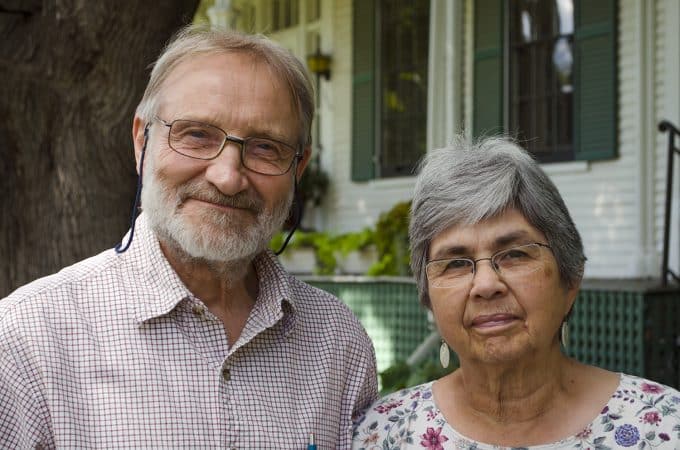
D. Keith and Ellen (Slabaugh) Helmuth, of Woodstock, New Brunswick, Canada, are being honored with the Eastern Mennonite School Lifetime Service Award for 60 years of professional and personal engagement in care for creation. Both are members of the class of 1955.
“They were environmentalists before it was popular,” wrote lifelong friend, classmate, and roommate James Lapp in his nomination, describing them as “humble and unsung.”
The couple had hoped — before coronavirus — to celebrate their 65-year class reunion in Harrisonburg at Homecoming Weekend, Oct. 16-18. Instead, the group — which has a record eight married couples from the class — will connect virtually.
Keith and Ellen, parents of two adult sons and members of a Quaker community, have — together and individually — pursued environmental education, organic farming, community economic and social development work, writing for publication and public presentation, the founding of Quaker Institute for the Future, and book publishing on environmental themes.
Watch a video of the couple reflecting on their life, work, EMS and words for younger generations.
“Everything started for us from the standpoint of service and community,” writes Keith, reflecting on their life journey. Amish and Mennonite roots, and childhoods spent close to the earth set them on the path to devote their lives to earth care and advocacy.
Precious Memories
Reflecting on their journey for this award conjured some good memories. “Jim Lapp and I were roommates for our senior year at EMHS,” writes Keith, noting that “Jim, Joe Longacher, Leon Stutzman, and I were especially good friends in those days and ever since.”
Leon and Keith were roommates in their junior year of high school, and Keith and Joe were roommates for their first year at Eastern Mennonite College. “So I had the great benefit of a close association with each of these remarkable men in those formative years.”
A photo of Jim and Keith in their pajamas in their bunk beds in their dorm room recently came to light. Jim brought a copy to Keith on a visit in 2019 (not suitable for publication, Keith contends!). The dorm window shown in the photo “is the one from which I waved to Ellen on November 17, 1954, after she had given me a lovely Buxton leather wallet for my birthday,” recalls Keith.
“I had come back to my third floor dorm room while she waited in her Dad’s car in the driveway below for me to appear at the window to wave goodnight. I have always remembered the special feeling of connection I had looking down at her and waving goodnight. Jim, Joe, and Leon were in the room and there was envious joking about how lucky I was. Indeed!”
Here, Keith reflects on what transpired in the 65 years since those days, a lifetime of shared interests and passions that saw them use their energy to nurture a small corner of creation while sharing broadly through relationships, entrepreneurship and the written word to influence others for the greater good.
Q: What motivated you to get involved in earth care early in the movement?
We both grew up in homes where service to community was the basic value. The ethic of service was so basic that it was like the air we breathed. This is one of the imperishable blessings of the Mennonite heritage. It’s also true that for both our families the Amish way of life was an ancestral heritage with which we had direct contact. “Keeping faith with the land” is a context of guidance that naturally translated from our common heritage to our vocational callings.
I grew up in a highly self-provisioning family in northeastern Ohio and spent a lot of my childhood roaming the surrounding woodland. Ellen grew up in Park View just down the street from EMS but also in a family that kept a cow, chickens, and pigs, and grew a big garden.
Ellen’s parents were Moses and Mary Slabaugh of Harrisonburg, Virginia. Moses was a Mennonite Church pastor well known for his compassion and sense of humor. He was a skilled furniture maker, and had a small chicken raising business. Mary was an editor of church publications and, after her children were grown, became a much loved elementary school teacher.
My parents were Atlee and Naomi Helmuth of Aurora, Ohio. In his late teens, my father, Atlee, took over a small roofing business from his father and became known over northeastern Ohio for the quality of his work and his absolute guarantee of customer satisfaction. Naomi was an avid gardener of both vegetables and flowers. After Atlee died at age 45, she developed a business of caring for children in their homes when their parents were travelling.
When I came to EMS for my last two years of high school, I fell in love with Ellen and with the Blue Ridge Mountains. We both loved the beauty of the mountains and enjoyed drives and hikes along Skyline Drive. In those days the skies were pollution free and the mountains could always be clearly seen from the Shenandoah Valley and the valley could be viewed for miles both north and south from the mountains.
We graduated from Eastern Mennonite High School in 1955, only 10 years after the end of the Second World War. In that decade, a massive surge of industrial development and an exploding consumer economy began sweeping across North America. There were no regulations on the toxic pollution that could be dumped into rivers and into the atmosphere.
In Ohio, I saw the building of the Ohio Turnpike rip through the woods where my mother as a little girl felt the presence of God in the beauty of spring wildflowers. The Cuyahoga River near Cleveland became so polluted that the fish all died. The surface of the river caught fire and burned a bridge.
In the Shenandoah Valley air pollution began to show up as increasingly murky skies. The effluent from coal fired power plants hundreds of miles to the west began to spread over the mid-Atlantic and northeastern states and come down as acid rain, decreasing soil fertility and doing long-term damage to forest environments.
Over the next decade the scale of toxic pollution dramatically increased along with damage to all the natural systems on which life depends—lakes, rivers, forestland, soils, and the atmosphere. By the early 60s it was crystal clear that the industrial-consumer economy was creating a catastrophe for the commonwealth of life, and that it would only get worse if it continued on its course of unlimited growth.
Something was definitely wrong with this situation. In order to accumulate wealth, the industrial-consumer economy was destroying the goodness of God in Creation. From the standpoint of science this situation was irrational. From the standpoint of religious faith it was blasphemous.
Q: How did all this impact your vocational choices?
By this time we had finished our university studies and were moving toward vocational options. Ellen was working in nutrition related medical research. I was managing a bookstore and deep into a study of ecology, earth system science, and human geography. During this time we learned about a new college being established by Quakers that was putting “world problems and their potential solutions” at the center of its study program, Friends World College. The environmental crisis of human impact on Earth’s ecology was among the “world problems” on the study program.
In 1967 we were both hired by the college. After three years, one of which was spent at the East African Center in Kenya, we decided to move from theory to practice and purchased a farm in Canada, high in the hills above the St. John River Valley in the Province of New Brunswick.
From research and teaching we moved to working directly with the environmental situation that most concerned us — the food system — and which, by virtue of our family backgrounds, we were well equipped to undertake. In addition, we now had two sons, five and six, and we wanted to create a way of life and livelihood in which they had the same opportunities for experiential learning and skill development that we had in our childhoods.
Everything started for us from the standpoint of service and community. We usually think of “community” as the human community, but once you understand that the commonwealth of life is an Earth community, it is a natural step to see that the common good for the human community is the same as the common good for the Earth community, and that the destruction of Earth’s biodiversity is the destruction of the environment on which human communities depend for well being and survival.
The health and well being of the human community is dependent on the health and well being of the rest of the commonwealth of life. Humans are an integral component of that greater whole we call Creation, and people of faith should do everything they can to preserve and uphold the goodness of God in Creation. This deep faith, which is inherent in both the Anabaptist-Mennonite heritage and the Quaker tradition, to which we are also attached, is at the core of our ecological and community service vocations.
Q: What are highlights of your vocational journey?
1. I helped develop and was the first Coordinator of the Independent Study Program for students at Friends World College which operated for 30 years and was picked up by Long Island University.
2. We operated North Hill Farm near Woodstock, New Brunswick, for almost three decades. The farm was the economic base from which we helped advance local food security through the development of Farm Markets and the promotion of small farm, market garden, and self-provisioning agriculture.
3. Ellen was lead organizer and the first manager of the Woodstock (New Brunswick) Farm Market Cooperative and went on to help found the New Brunswick Farm Market Association. The Woodstock Farm and Craft Market has had its own building in downtown Woodstock since 1991 and now operates six days a week and will celebrate 50 years in 2023.
4. I served on the board of the local credit union for 25 years, which grew from a savings and loan operation with assets of $70,000 to a full service financial institution with assets topping $108 million.
6. In 1991, I served as delegate from Canadian Yearly Meeting of the Religious Society Friends (Quakers) to the World Council of Churches’ Convocation on Justice, Peace, and Integrity of Creation in Seoul, Korea, where I served as a consultant to the committee that drafted the Convocation’s final report.
7. In 2003, I was instrumental in the founding of Quaker Institute for the Future, a network organization dedicated to research and education on the intersection of ecology and the economy. I helped initiate the Institute’s publication program, which began in 2009 with the book, Right Relationship: Building a Whole Earth Economy, and has since published 13 additional books.
8. In 2014, we established Chapel Street Editions, a non-profit, natural history and cultural heritage publishing company focused primarily on regional environment and culture. Chapelstreeteditions.com
9. We have recently taken the lead in establishing a community garden in our hometown.
Q: What advice would you have for a high school student today, particularly students who are passionate about climate change but may feel overwhelmed or hopeless?
Don’t give up. It’s alright to feel angry. Remember Greta Thunberg. There’s plenty to feel angry about considering what has been foisted on you by previous generations. But anger management is important. A slow burn can spur your motivation. A big flare up wastes your energy and disrupts clear thinking.
Turn anger into determination. Turn determination into imagination. Turn imagination into empathy. Think about what affect our decisions today may have on our descendants. Dedicate yourself to being a good ancestor. Dig into the science and the economics of climate change. Watch out for conspiracy theories.
But remember, for most people it’s not personal. It’s a system problem. All of us, including our ancestors, have been caught up in an economic system of unlimited growth that seemed to promise a good life, but has now produced the conditions for ecological and economic collapse.
System problems can only be addressed through system change. Once we realize this, it does become personal. When the problem is clearly understood by a significant number of key persons the tipping point for system change will be reached. The fact that you are concerned about climate change means you are one of those key persons… You need a feeling for integrity, a feeling, both emotional and intellectual, about how the ecological processes of Earth foster, nourish, and maintain the flourishing of life, and that your life is part of that great flourishing.
Although we usually speak about this in scientific terms, this sense of connection—of being centered in the perception, experience, and feeling of integrity—can just as well be expressed in spiritual terms. We speak of participating in the Divine Life, the Life of the Spirit, or of the goodness of God in Creation.
Q: What gives you hope for the future?
“Hope” is not an adequate stance from which to engage the circumstances of the human future. In order to keep going and not give in to the despair of fatalism we need to be firmly centered in the sense of integrity that comes to us from our connection to the great flourishing of the whole Earth community.
Despite everything to the contrary, we can see this spiritual strength rising to the challenge, especially in young people. We have heard the slogan, “Keep Hope Alive.” But hope can so easily fade; better we should make our way into the future with “Keep Integrity Alive” ringing in our ears and glowing with passion in our hearts.
… there are alive and well in the world examples of how to live in a mutually beneficial human-earth relationship, the most notable and enduring of which are Amish communities, and in particular Amish agriculture. This is not to say that Amish communities can be held up as a model for societal transformation. But it is to say that the practices of regenerative agriculture and community-based economic and social resilience the Amish exemplify, offer a path of development and re-adaptation to Earth’s ecological integrity that holds out a better prospect for the human future than does the high risk and now faltering industrial-consumer economy.
Sometimes the best path into the future requires the redeployment of what worked well in the past. Strange as it may seem, the Amish way of life is ahead of the curve in modeling significant aspects of a human-earth relationship based on ecological integrity, does not cause climate change, and which honors the goodness of God in Creation.

